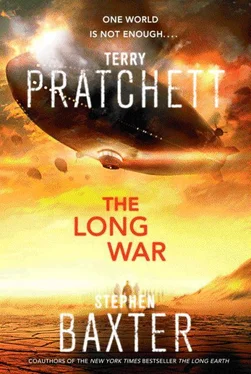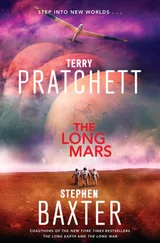Terry Pratchett - The Long War
Здесь есть возможность читать онлайн «Terry Pratchett - The Long War» весь текст электронной книги совершенно бесплатно (целиком полную версию без сокращений). В некоторых случаях можно слушать аудио, скачать через торрент в формате fb2 и присутствует краткое содержание. Год выпуска: 2013, ISBN: 2013, Издательство: Harper, Жанр: Фантастика и фэнтези, на английском языке. Описание произведения, (предисловие) а так же отзывы посетителей доступны на портале библиотеки ЛибКат.
- Название:The Long War
- Автор:
- Издательство:Harper
- Жанр:
- Год:2013
- ISBN:978-0-06-206777-7
- Рейтинг книги:4 / 5. Голосов: 1
-
Избранное:Добавить в избранное
- Отзывы:
-
Ваша оценка:
- 80
- 1
- 2
- 3
- 4
- 5
The Long War: краткое содержание, описание и аннотация
Предлагаем к чтению аннотацию, описание, краткое содержание или предисловие (зависит от того, что написал сам автор книги «The Long War»). Если вы не нашли необходимую информацию о книге — напишите в комментариях, мы постараемся отыскать её.
The Long War — читать онлайн бесплатно полную книгу (весь текст) целиком
Ниже представлен текст книги, разбитый по страницам. Система сохранения места последней прочитанной страницы, позволяет с удобством читать онлайн бесплатно книгу «The Long War», без необходимости каждый раз заново искать на чём Вы остановились. Поставьте закладку, и сможете в любой момент перейти на страницу, на которой закончили чтение.
Интервал:
Закладка:
Roberta pressed her forehead against the window, gawping, briefly looking like any curious teenager. “I see animals, moving through the forest. Elephants? Heading towards that river over there, to the north.”
Chen smiled. “Elephants, which roam as far north as Beijing in some worlds. And camels, bears, lions, tigers, black swans, even river dolphins. Tapirs! Deer! Pangolins! On Step Day, our children choked in the smog-free air, were frightened by the brightness of the sun, and goggled at the animals.”
The Captain pressed his control button again.
In East 3 the forest had been cleared, and the river dammed to flood the ground. In the resulting paddy fields, people laboured, bent over, not looking up as the shadows of the airships passed. It was the same in East 4, 5, 6 and beyond, though the methods of farming differed. In some worlds there was industrialization, with smoke rising from distant power stations and foundries, and crude-looking machines rolling across vast fields; in others, just the people and their animals.
“Very organized,” Jacques said.
“Oh, yes,” Yue-Sai said brightly. “We Chinese were able to move out into the stepwise worlds in a disciplined and industrious way, matched, I would suggest, nowhere else in the world. Under the Communists we were a one-party state equipped with the tools of late capitalism—capable of very large-scale feats. In recent decades we had already had experience of massive projects on the Datum: infrastructure like dams and bridges and rail lines, even a space programme. Now the Long Earth offered a blank canvas. Since the regime change, despite a revision of ideology, we have lost none of those skills. That’s China for you!”
Roberta said, “Could we pause here?”
“Of course.” Chen pressed his buttons.
Jacques looked down. The airship was hovering over a waterlogged field, where a peasant stood patiently, holding a piece of rope tied around the neck of what looked like a buffalo. “That’s a scene that could be two thousand years old,” he said.
Roberta said, “Captain Chen, in some of these agricultural worlds there are factories. Producing artificial nutrients?”
“Also genetically engineered crops. Modern farming machinery—”
“Yet here, you are evidently manuring the soil. It seems a contradiction.”
Yue-Sai said, “We use both ways. This is an expression of an old tension in Chinese philosophy.”
“The Dao versus Confucianism,” Roberta said.
Chen looked impressed.
Yue-Sai nodded. “Essentially correct. The Dao is the way—to follow the way means a harmonization with nature. The Confucians by contrast argue that man must master nature, for the betterment of nature as well as the benefit of mankind. Wars have been fought over these ideas. The Confucians won in the second century BC. But now we have room to spread out, to explore other ways.”
“ Dao zai shiniao ,” Roberta said.
Chen laughed out loud. “The way is in the piss and the shit! Very good, very good.”
Roberta seemed neither pleased nor offended by his praise.
The airship moved on. Around East 20, a belt of more industrialized worlds began. Jacques looked down on factories, power stations, mine heads, industrial parks cut into the green. Lines of workers moved between workshops and shabby-looking dormitory, refectory and shower blocks. Cargo airships hovered, or were tethered to masts. On many of these worlds, smoke and soot and smog hung thick in the air.
Chen was observing their reactions. “Few westerners have seen this. Save for those who have put money into these Third Front developments. Douglas Black for one.”
Jacques asked, “Why ‘Third Front’?”
“Ah, that’s a reference to Mao,” Chen said, and winked again. “In response to aggression from the Soviets in the 1960s Mao scattered industrial production facilities across China—into the remote west, for example. So that it became more difficult to cripple us with nuclear bombs, you see. He encouraged workers to go out there. ‘The Further from Father and Mother, the Nearer to Chairman Mao’s Heart’—that was the slogan. As then, so now. One can despise Mao’s crimes while admiring his ambition.”
Jacques wondered if you could have one without the other. He said, “You can’t seriously be suggesting there’s a risk of some kind of shooting war with the west.”
“There are other threats. Stepping itself has destabilized nations—including China of course. And climate collapse on the Datum, with all that would follow, could yet be a serious issue.”
They came to a world—East 38, according to the wall counter—where a thunderstorm was raging. The two airships drifted in a sky populated by huge, lumpy, rushing grey clouds, and rain lashed down on the forest below. Jacques observed what looked like the scars of lightning strikes, blackened craters in the forest cover.
Chen watched them expectantly.
“I don’t understand,” Jacques said. “What is it we are meant to see here?”
“You could only perceive it properly from orbit, perhaps,” Chen said. “Here, soldier-engineers are using atomic weapons to blast paths and tunnels through the Himalayas, thus removing an accident of geology that disrupted the flow of air and moisture across Eurasia. In this world, the interior of Asia will be green.”
Jacques was astonished. “You’re reshaping a whole mountain range?”
“Why not? And in another neighbouring world, we are diverting all the rivers arising in the Himalayas, save for the Yangtze, again to bring moisture to the heart of the continent.”
Roberta said, “More dreams of the Maoists.”
“Yes! You know your history. Schemes that were too expensive, or too risky, to be tried out when the Datum was all we had. Now we can experiment with no harm done. What dreams we have, what ambition! Aren’t we Chinese great?”
Maybe. But Jacques wondered what the experience of these new worlds, these diverse environments, was doing to the souls of the colonists here. In the West worlds, different Americas were evolving, sharing their parent’s values maybe but subtly diverging. Here too that must be true, with new kinds of China developing, still rooted in the same deep history—surely the Chinese would always stay Chinese—but each acquiring a whole new character. And he wondered how soon it would be before those new Chinas became restless in search of freedom from their gigantic parent, like the Valhallan Belt Americas.
As the lightning cracked in the sky, the trolls were growing anxious, their song fragmented.
Chen lifted his remote control, apparently with regret. “I would love to show you our new mountains. But we cannot linger; it is unsafe here.”
Jacques asked, “Why, the lightning?”
“No, no. The fallout from the atomic mining. On we go… Now we will speed up. You understand these ships are an experimental sort, developed by our own engineering companies in conjunction with the Black Corporation. One purpose of this exploration is to test the new technologies.”
The passing of the worlds accelerated until, as Jacques could tell from his own pulse, the realities were washing past at the rate of roughly one a second, blink, blink, blink, then faster still. Most of the worlds were unremarkable, blankets of green under sunshine or cloud. But in some glaciated worlds the sunlight glared from ice sheets, safely far beneath the prows of the twains.
They were shown to a kind of lounge area. A steward circulated with food, soft drinks, China tea, and they sat, chatting while whole worlds flapped by, unremarked. Jacques suspected Roberta would rather have been alone, studying, reading, making her own observations. But she sat politely enough, if mostly silently.
Читать дальшеИнтервал:
Закладка:
Похожие книги на «The Long War»
Представляем Вашему вниманию похожие книги на «The Long War» списком для выбора. Мы отобрали схожую по названию и смыслу литературу в надежде предоставить читателям больше вариантов отыскать новые, интересные, ещё непрочитанные произведения.
Обсуждение, отзывы о книге «The Long War» и просто собственные мнения читателей. Оставьте ваши комментарии, напишите, что Вы думаете о произведении, его смысле или главных героях. Укажите что конкретно понравилось, а что нет, и почему Вы так считаете.











